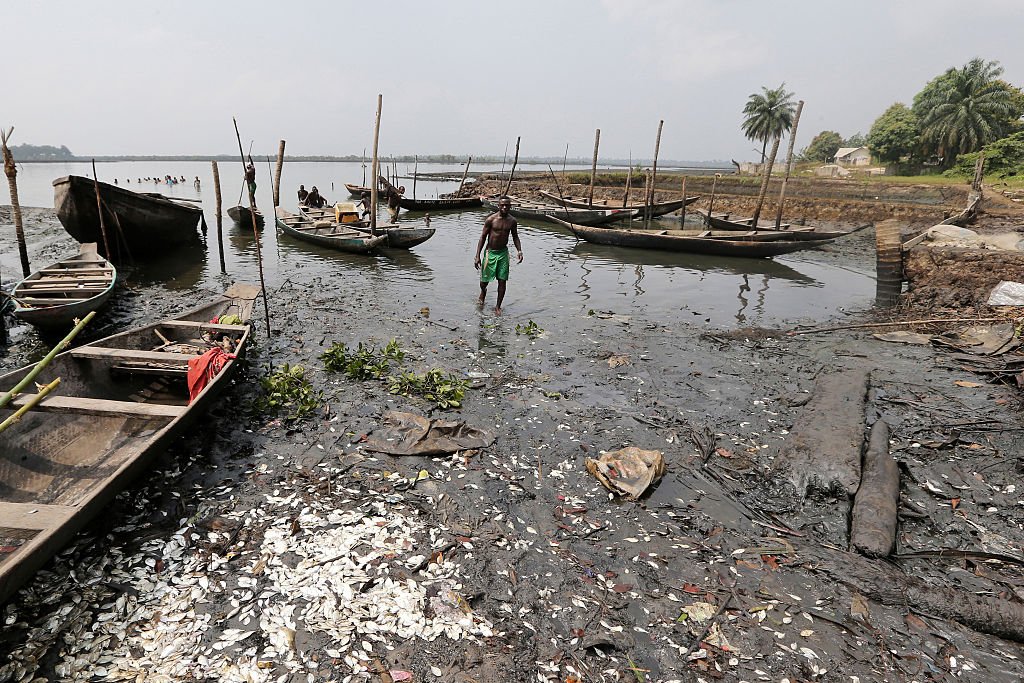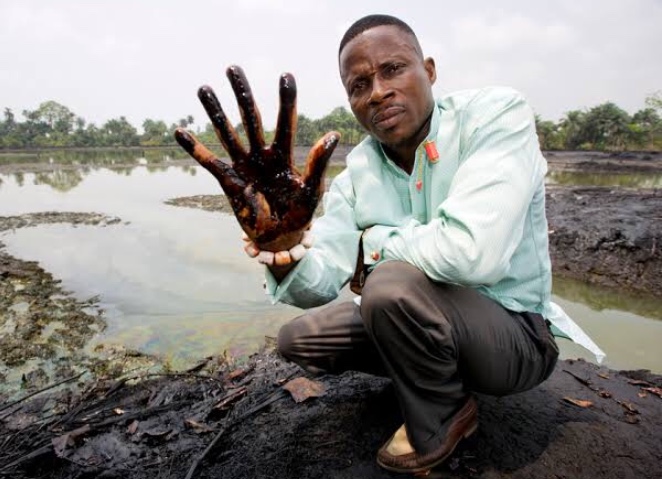Is Shell’s Exit from Nigeria a Front to Dodge Legal Responsibilities?
AFRICA, 24 Jun 2024
Andy Rowell and James Marriott | openDemocracy - TRANSCEND Media Service

Dead fish lie on the polluted shoreline as a result of the 2008 Shell oil spill in Bodo, Nigeria.
George Osodi/Bloomberg via Getty Images
The oil giant is selling its Niger Delta subsidiary – but lending the new owners the money for the purchase.
6 Jun 2024 – Nigerian activists believe Shell’s apparent end to its 87-year operation in the country is an effort to avoid its legal responsibilities while holding onto the potentially profitable side of the business.
In January, the oil giant revealed it had “reached an agreement to sell its Nigerian onshore subsidiary” to Renaissance, a consortium of four Nigerian oil firms and one based in Switzerland.
But despite the $2.8bn deal, Shell will effectively still own part of the business and will continue to bankroll Renaissance’s onshore exploration in Nigeria going forward.
The company’s press statement confirmed it will loan the new buyers up to $1.2bn to help them buy their stake in the Shell Petroleum Development Company of Nigeria Limited (SPDC).
It will also provide Renaissance with “financing of up to $1.3bn over future years”. This will fund its “share of specific decommissioning and restoration costs” and part of the development of gas resources for NLNG, a company producing natural gas in Nigeria to export to global markets, in which Shell will retain a 25.6% interest.
Renaissance, meanwhile, will take over responsibility for dealing with spills, theft and sabotage, as well as Shell’s ongoing contributions to the remediation of past environmental damage.
Campaigners have told openDemocracy that Shell should not be allowed to escape culpability for the environmental and societal damage it has caused in Nigeria.
Celestine Akbopari, a long-term environmental activist from Nigeria’s Ogoni region, said: “Shell has to restore our environment and lost livelihoods before selling anything. Our environment should be restored to the level Shell met it.”
Akbopari believes the millions of oil barrels spilt in the Niger Delta over almost nine decades have significantly worsened his community’s finances. There were more than 10,000 oil spills between 2011 and 2022 alone, according to the National Oil Spill Detection and Response Agency.
“Our people enjoy their fishing and farming business but can’t do that anymore,” Akbopari said. “In a situation where there is a complete absence of government as we presently have in Nigeria, it is monies we get from our fishing and farming business that we use in sending our children to school, provide health care and pay other bills.
“Now, we can’t even do that and we watch our children and dependents die of hunger and sickness because of poverty.”
Civil society and community opposition to Shell has been widespread in Nigeria since the early 1990s. Many have been angered by the pollution the company has emitted in the country, as well as its burning of natural gas – a practice associated with oil extraction that can save an energy firm money but is associated with serious health complications for those living nearby.
Public discontent only grew after the executions of the Ogoni Nine, a group of activists who opposed Shell’s operations in the Niger Delta and alleged exploitation of the Ogoni people.
The activists were sentenced to death at a trial by Nigeria’s military in 1995, having been accused of inciting the murders of four Ogoni chiefs who disagreed with the strategy of their organisation, the Movement for the Survival of the Ogoni People.
Shell had a ‘watching brief’ at the trial, which was widely discredited even at the time – with then UK prime minister John Major describing it as “fraudulent”. Several key witnesses have since claimed Shell actors and government officials “bribed” them with offers of money, a house, and jobs at the oil company to say the activists had been involved in the murders. The oil giant has always denied these accusations, as well as claims it colluded with the Nigerian military on the trial.
In the decades since, Ogoni communities have sought justice and tried to hold the oil giant accountable for the role they believe it played in the activists’ deaths.
Shell, meanwhile, has tried to distance itself from its Nigerian subsidiary with a public relations response driven not by staff in Lagos or Port Harcourt but by its London head office, which suggested there was a problem with one local branch in Africa, but not a larger issue – a practice it began even before the trial.
In a 1993 letter, Shell said it did “not operate using a top-down management approach”, adding: “Each operating company not only has its own legal identity, but also responsibility for its own day to day operation.”

Man shows the crude oil that has eroded the banks of the creek through his village of Goi in Ogoniland in the Niger Delta, May 2019.
(Milieudefensie, Flickr, CC BY-NC-SA 2.0)
‘Legal Gymnastics’
Nigerian political scientist Claude Ake believes Shell has always responded to the backlash against its operations in Nigeria with a focus on “damage limitation”, rather than sincerity.
This alleged strategy of reputation protection is seemingly present in the oil giant’s court cases. Back in 2009, Shell agreed to pay $15.5m to the family of Ken Saro-Wiwa, the president of the Movement for the Survival of the Ogoni People, who was one of the Ogoni Nine. In doing so, the company walked away from the case denying liability. Before settling, Shell had made repeated attempts to get the case thrown out.
Other court cases have been brought against Shell over the deaths of the Ogoni Nine – so far without success. But another group of activists won an unrelated battle with the company in the Netherlands in May 2021, in which Shell was found liable for causing dangerous climate change worldwide and ordered by District Court of the Hague to reduce its CO2 emissions by 45% within ten years.
The historic verdict, which could pave the way for more prosecutions of Shell and other big international polluters, was brought by Friends of the Earth Netherlands (Milieudefensie, in Dutch) and six other organisations and 17,000 co-plaintiffs.
Milieudefensie sent a letter to Shell’s Board of Directors in April 2022, calling for urgent action to comply with the 2021 verdict. The NGO warned about personal liability risks resulting from a failure to act. In July of that year, Shell appealed the decision.
Shell’s Nigerian operations have also been the subject of lawsuits in the UK.
The company agreed to pay £55m to settle a case brought by 15,600 members of the Bodo community after a massive oil spill in the area in 2014. Leigh Day, the the British law firm that represented the community, told openDemocracy Shell had admitted some fault, but disputed the amount of oil spilt.
And last November, London’s High Court ruled that 13,000 farmers and fishers from the Ogale and Bille communities can sue Shell over chronic pollution of their water sources and destruction of their way of life. A report in The Guardian at the time said Shell denied directly owing the claimants, though it said its Nigerian subsidiary, the SPDC, had accepted responsibility for the spills it caused and compensated affected parties where required.
Leigh Day, which is also representing the Ogale and Bille communities, issued a statement after Shell announced the SPDC’s sale to Renaissance, saying its “clients are concerned about how the proposed sale could affect their claim”. The law firm has since told openDemocracy that the details of the sale still remain unclear.
In its statement, Leigh Day added: “It would be unconscionable for Shell to pack up its onshore operations in Nigeria without cleaning up its mess and paying compensation…
“We consider that Shell, having made billions of pounds over decades from extracting oil resources from Nigeria, should fulfil its legal responsibilities and not leave behind an environmental catastrophe as it seeks to exit the Niger Delta.”
Renaissance, which is based in Nigeria, will likely be immune from lawsuits in the Netherlands or the UK – one reason why activists and civil society organisations have called on the Nigerian government to stop the sale.
Last month, international and Nigerian NGOs, including Amnesty International and Environmental Rights Action/Friends of the Earth Nigeria, wrote to the Nigerian Upstream Petroleum Regulatory Commission, urging it “to refuse regulatory approval” for the sale.
The letter added: “Shell should not be permitted to use legal gymnastics to escape its responsibilities for cleaning up its widespread legacy of pollution.
“The sale… should not be permitted unless local communities have been fully consulted; the environmental pollution caused to date by SPDC has been fully assessed; and funds have been placed by SPDC in escrow sufficient to guarantee that clean-up costs will be covered.”
Shell did not answer openDemocracy’s questions, with a spokesperson instead directing us to a press release and FAQ section about the sale on its website.
Cindy Baxter, who has campaigned against the oil industry for decades, told openDemocracy: “Nearly 30 years after Ken Saro-Wiwa and eight others were hung for protesting Shell’s pollution, the Ogoni people are still fighting it in the courts. Before this corporation leaves the country, it must clean up – and pay for its environmental crimes.”
_____________________________________________
Andy Rowell and James Marriott – together with Lorne Stockman – are co-authors of ‘The Next Gulf – London, Washington & the Oil Conflict in Nigeria’. See also ‘Crude Britannia – How Oil Shaped a Nation’ by Marriott & Macalister.
Go to Original – opendemocracy.net
Tags: Africa, Big Oil, Capitalism, Energy, Environment, Fossil fuels, Nigeria, Organized crime, Shell
DISCLAIMER: The statements, views and opinions expressed in pieces republished here are solely those of the authors and do not necessarily represent those of TMS. In accordance with title 17 U.S.C. section 107, this material is distributed without profit to those who have expressed a prior interest in receiving the included information for research and educational purposes. TMS has no affiliation whatsoever with the originator of this article nor is TMS endorsed or sponsored by the originator. “GO TO ORIGINAL” links are provided as a convenience to our readers and allow for verification of authenticity. However, as originating pages are often updated by their originating host sites, the versions posted may not match the versions our readers view when clicking the “GO TO ORIGINAL” links. This site contains copyrighted material the use of which has not always been specifically authorized by the copyright owner. We are making such material available in our efforts to advance understanding of environmental, political, human rights, economic, democracy, scientific, and social justice issues, etc. We believe this constitutes a ‘fair use’ of any such copyrighted material as provided for in section 107 of the US Copyright Law. In accordance with Title 17 U.S.C. Section 107, the material on this site is distributed without profit to those who have expressed a prior interest in receiving the included information for research and educational purposes. For more information go to: http://www.law.cornell.edu/uscode/17/107.shtml. If you wish to use copyrighted material from this site for purposes of your own that go beyond ‘fair use’, you must obtain permission from the copyright owner.
Join the discussion!
We welcome debate and dissent, but personal — ad hominem — attacks (on authors, other users or any individual), abuse and defamatory language will not be tolerated. Nor will we tolerate attempts to deliberately disrupt discussions. We aim to maintain an inviting space to focus on intelligent interactions and debates.